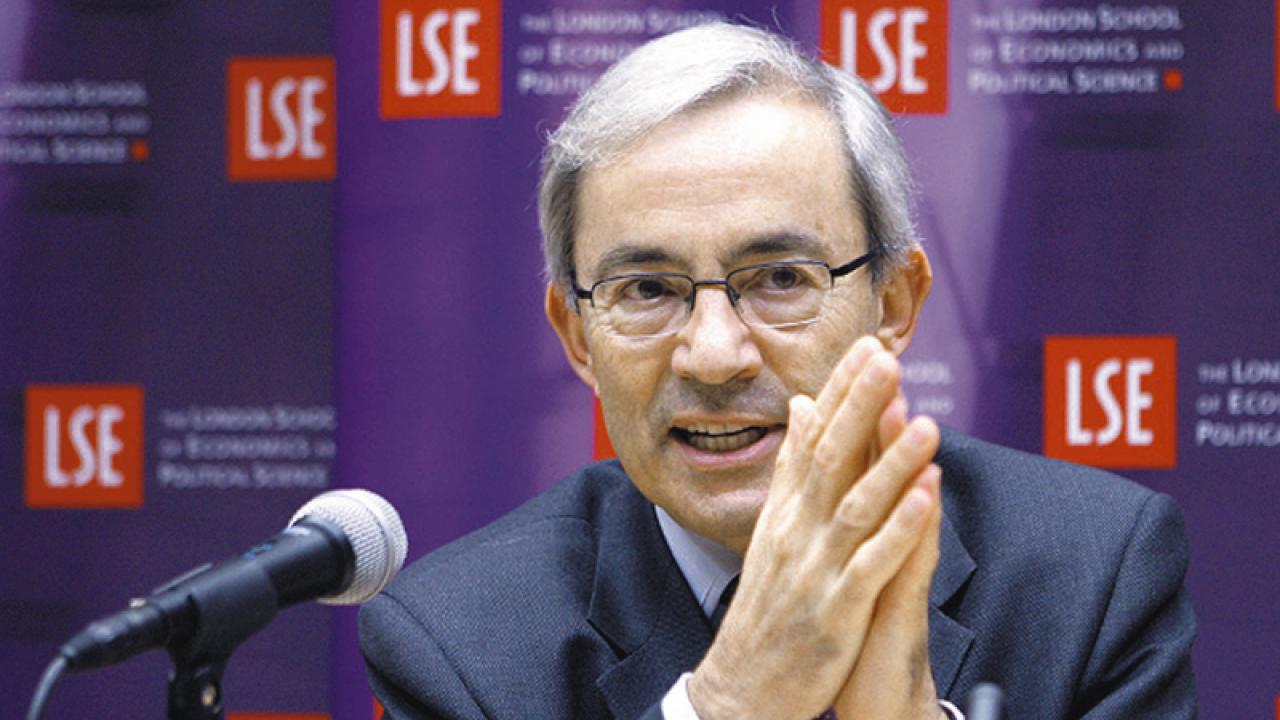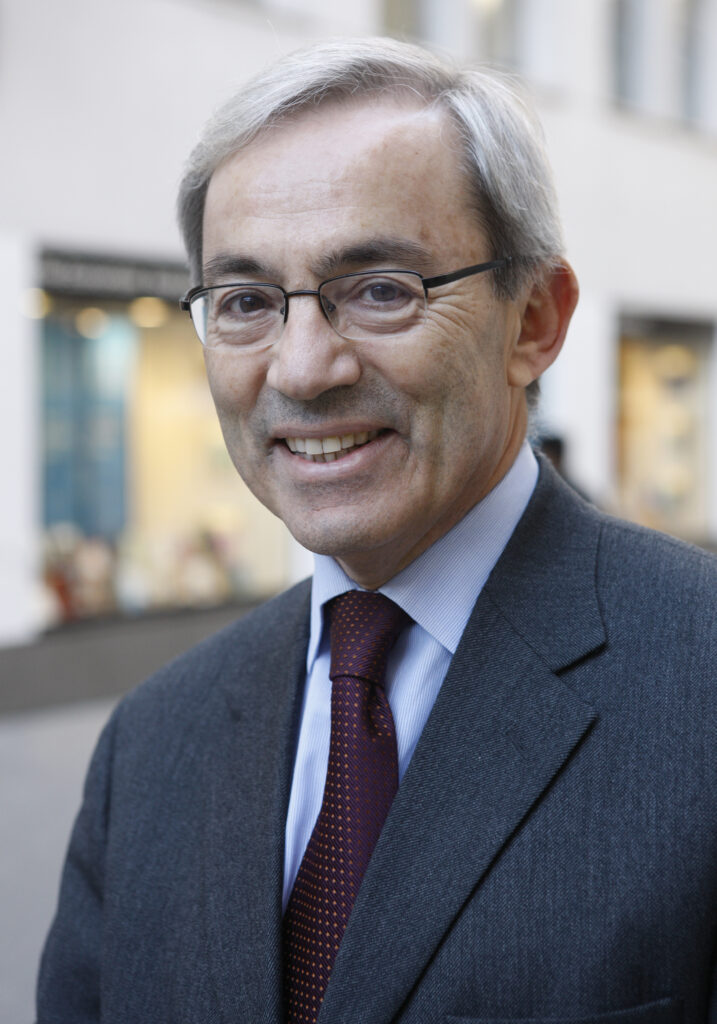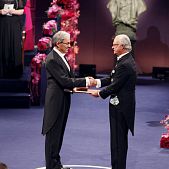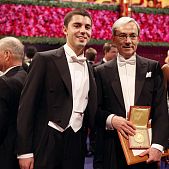
The Nobel Prize-winning economist and Knight of the British Crown
Sir Christopher Pissarides is Regius Professor at the London School of Economics (LSE), where he also heads the Macroeconomic Research Program at the Center for Economic Performance. He is Professor of European Studies at the University of Cyprus and President of the Council of National Economy of Cyprus. He specializes in labor market economics, macroeconomic policy, economic growth and structural change.
He was born in Nicosia, Cyprus, on February 20, 1948. When he finished school at the age of 17, he was still to young to do his military service and so he managed to leave for studies abroad. Originally, as he mentions in his biography, Mr. Pissarides wanted to become an architect, but after the encouragement of his parents he studied economics -a field he found interesting- at the University of Essex, Great Britain, where he obtained his degree in 1970. In the following year he completed his postgraduate studies there. He then joined the LSE, where he completed his doctorate in 1973, under the supervision of mathematician economist Michio Morishima.
In 1976, Christopher Pissarides began working as a lecturer at the LSE. At that time, unemployment was the most important problem in British society. The youngest economist at that time observed the unemployment shock caused by unemployment in Britain’s political and social environment and decided to devote himself to the causes that caused it.
In 2005, Mr. Pissarides became the first economist outside the US to win, together with Dale Mortensen, the prestigious International Job Labor Institute (IZA) award in Labor Economics. He is a member of the Econometric Society, the British Academy, the Academy of Europe and several other scientific associations, and is also an honorary member of the American Economic Association.
He also held the “Norman Sosnow” headquarters of the Department of Economics, at the same university. He has written in scientific journals and in the press, and his book Equilibrium Unemployment Theory is a reference point in unemployment economics and has been translated into many languages.
The result of his multi-year studies and research was to be honored in 2010 with the Nobel Prize in Economics, along with Dale Mortensen of Northwestern University and Peter Diamond of MIT, for his work in analyzing market friction and contributing to the mapping of correlations which link the outbreak of unemployment to monetary and macroeconomic policies.
The Swedish Academy of Sciences rewarded the patience of decades of university professors with ethos and values, who individually and collectively succeeded in improving the ability of economic science to analyze hot and topical social and economic problems such as unemployment. Mr. Pissarides became the third person in the Greek space, after the poets George Seferis in 1963 and Odysseus Elytis in 1979, which was awarded the Nobel Prize.
As Mr. Pissarides said in his interview along with Mr. Mortensen and Mr. Diamond after receiving his Nobel Prize, his dealing with hot economic policy issues, particularly unemployment, through the Center for Labor Economics’ research projects, and then of the LSE’s Financial Performance Center, was an important motivation that prompted him to focus more on the problem of unemployment.
In the same interview, he revealed that he had been deeply influenced by the study of Wage Theory, the classic work of the top English economist and Nobel Prize winner John Hicks for Labor Economics, published in 1932, and stressed the importance of frictions and the institutional framework for full understanding the labor market beyond the potential of the full competition model.
In 2011, he was awarded with the Grand Cross of the Order of Makarios III of the Republic of Cyprus. In 2013 he became Knight of the British Crown, taking the title “Sir”. Mr Pissarides’ title was given in the context of the annual honorary title giving, on the occasion of Queen Elizabeth’s birthday. The head of the National Economy Council and professor at the LSE was honored with the title of Ernen Knight, the original degree of chivalry, for his services in the field of economics.
On November 5, 2015, he was elected a full member of the Academy of Athens at the “Economic Sciences – Development and Employment” headquarters in the class of Ethics and Political Sciences.
Professor Pissarides said in an interview that “New technologies of robotics and artificial intelligence can abolish certain professions, but they will cause an explosion in the creation of new jobs in areas that do not exist today. Just as electricity, the internal combustion engine and the railroad have degraded the wagons and caused a cosmogony that started from engineering and construction and stretched as the expansion of cities into areas that were inaccessible”.
For example, he added that Greece could solve the problem of unemployment simply by investing in health. Striding developments in health sciences, coupled with an aging population, will make the care and welfare sector the fastest growing. And all of this without having even talked about the status of advanced artificial intelligence programs to learn deeply and acquire within a few hours skills, as recently happened in chess, that a man would take a lifetime to conquer.
Mr. Pissarides does not exclude a revolutionary development in which he referred to his speech at the Academy of Athens, that it will come a day when the Nobel Prize for Economics or Physics will be awarded to a robot. He also said, under the flames of the fire by Prometheus, that “The fire of Prometheus is a transfer for the new technology”, meaning that the fire of the new technology will always illuminate the impasse of man and society.
The Professor continued by saying that Athens now holds the negative record of the metropolitan group with the highest unemployment in the Eurozone, such as “Investing in new technologies, education and boosting productivity. Sweden devotes 4% of GDP to research and development of new technologies and thus achieves satisfactory growth and low unemployment, while through redistribution policies it forms the conditions for a society with a high level of education, lifelong learning, social services, health and welfare”.
Nobel Prize-winning economist Sir Christopher Pissarides, is undoubtedly one of the most prominent scientists in the world who are active in the fields of Economic Sciences, Development – Growth and Employment.
In recent years, he has focused his research interests on the international economy and policy as well as on economic growth, technological progress and structural changes in the long run of the economy. As a teacher of thousands of students in his career and adviser to a number of international and national organizations, he has contributed as few other scientists to the improvement of humanity.























